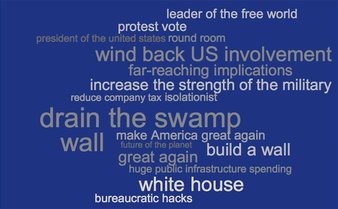
Graham Ring
Donald Trump has just been inaugurated as the President of the United States of America. This man who has no military or public service background is now the leader of the free world. He will sit in the round room in the White House for the next four years and make decisions that will have far-reaching implications for the future of the planet.
As a candidate, he presented very much as an ‘outsider’ - a business man who was not of the Washington professional political class. In fact he was disdainful of ‘beltway insiders’ and said that upon taking office he would ‘drain the swamp’ - identifying and dismissing bureaucratic hacks ill- equipped to take America in a new direction.
Voting in America – and most other parts of the world – is not compulsory. This means that opinion polls and predictions are even less reliable than they are in Australia. In a stunning election result, Trump failed to win the popular vote, but nevertheless garnered enough Electoral College votes to become President.
His campaigning style was one of broad themes, rather than specific policy undertakings. He tapped into a feeling, justified or not, of disaffection with the whole political machine, particularly amongst older white males. His defeated opponent, Hillary Clinton, was the archetypal Washington insider who Trump portrayed as representing everything that was wrong with a moribund political system. It is widely agreed that his win was significantly the result of the same kind of ‘protest vote’ that saw the remarkable ‘Brexit result in the UK, and the re-emergence of Pauline Hansen as a force on the Australian political scene
The promises and prescriptions Trump offered on the campaign trail were many and varied, but rarely cohesive or well grounded. At various times he has undertaken to:
Most of all, Trump has said he will ‘Make America Great Again’, - though it seems that when the rubber hits the road the policy prescriptions that will bring this laudable sentiment to fruition are more than a little subjective.
His willingness during the campaign, and subsequently as president-elect, to use Twitter to make his views known has caused more than a little consternation across the nation and around the world.
On more than one occasion, Trump has been goaded into intemperate spleen-venting responses on social media after personal attacks. This knee-jerk behaviour calls into question his suitability to conduct international diplomacy at the highest levels.
Picking an untried recruit in a national sporting team in the hope of a narrative of redemption and triumph is intoxicating. Picking an untried recruit to be President of the United States is rather more sobering.
Who needs Twitter when you’ve got the launch codes?
Graham Ring is a Darwin based writer and journalist.
Donald Trump has just been inaugurated as the President of the United States of America. This man who has no military or public service background is now the leader of the free world. He will sit in the round room in the White House for the next four years and make decisions that will have far-reaching implications for the future of the planet.
As a candidate, he presented very much as an ‘outsider’ - a business man who was not of the Washington professional political class. In fact he was disdainful of ‘beltway insiders’ and said that upon taking office he would ‘drain the swamp’ - identifying and dismissing bureaucratic hacks ill- equipped to take America in a new direction.
Voting in America – and most other parts of the world – is not compulsory. This means that opinion polls and predictions are even less reliable than they are in Australia. In a stunning election result, Trump failed to win the popular vote, but nevertheless garnered enough Electoral College votes to become President.
His campaigning style was one of broad themes, rather than specific policy undertakings. He tapped into a feeling, justified or not, of disaffection with the whole political machine, particularly amongst older white males. His defeated opponent, Hillary Clinton, was the archetypal Washington insider who Trump portrayed as representing everything that was wrong with a moribund political system. It is widely agreed that his win was significantly the result of the same kind of ‘protest vote’ that saw the remarkable ‘Brexit result in the UK, and the re-emergence of Pauline Hansen as a force on the Australian political scene
The promises and prescriptions Trump offered on the campaign trail were many and varied, but rarely cohesive or well grounded. At various times he has undertaken to:
- build a wall with Mexico
- reduce company tax
- increase the strength of the military
- adopt more isolationist foreign policy positions
- wind back US involvement in free trade agreements
- stop American-based companies decamping to countries where production costs are lower,
- embark on a program of huge public infrastructure spending which will cause serious shortness of breath amongst Republican deficit hawks in congress.
Most of all, Trump has said he will ‘Make America Great Again’, - though it seems that when the rubber hits the road the policy prescriptions that will bring this laudable sentiment to fruition are more than a little subjective.
His willingness during the campaign, and subsequently as president-elect, to use Twitter to make his views known has caused more than a little consternation across the nation and around the world.
On more than one occasion, Trump has been goaded into intemperate spleen-venting responses on social media after personal attacks. This knee-jerk behaviour calls into question his suitability to conduct international diplomacy at the highest levels.
Picking an untried recruit in a national sporting team in the hope of a narrative of redemption and triumph is intoxicating. Picking an untried recruit to be President of the United States is rather more sobering.
Who needs Twitter when you’ve got the launch codes?
Graham Ring is a Darwin based writer and journalist.

